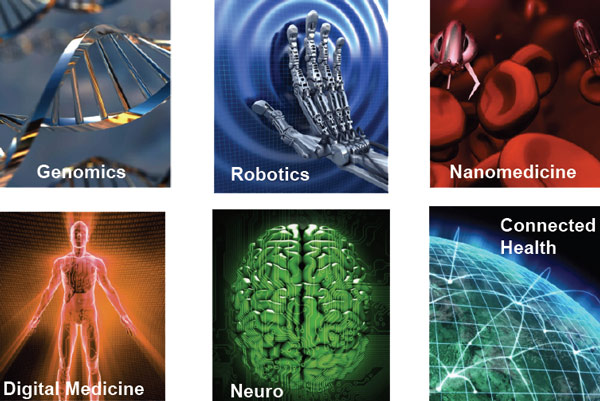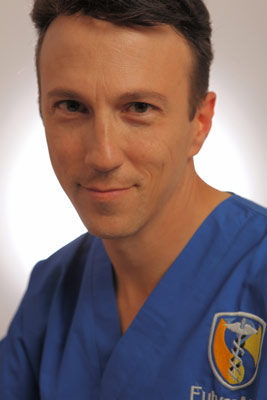Medicine + IT: an overview of promising technologies for developers
Daniel Kraft is a doctor who has enough knowledge in IT to explain what exactly is required from technologies for the development of the field. Now he has two goals:
Simply put, he suggests that it will be commercial success at the intersection of the spheres , which can serve as an excellent base for startups and large projects.
Below is a short interview that we had before the lecture, so that you could navigate to what he was going to talk about. Among other things, he mentions medicine for mobile devices, already almost real 3D printing of organs and social medical networks.

')
- Hello, Daniel. Please tell us a little about yourself so that Habr readers understand exactly what you are doing.
- In short: the chairman of the medical direction at the University of Singularity,
executive director of faculty FutureMed at the University of Singularity, founder and CEO of IntelliMedicine. More data is in my biography (approx .: it says about 20 years of clinical practice and impressive education) .
- What, in your opinion, will the new be introduced in medicine in the next 2-3 years?
- First, personalized medicine: the choice of treatment methods and drugs is based on the individual characteristics of the patient. Secondly, the rapid growth of the information base is expected - this makes it possible to analyze large volumes of information (from individual patients + crowdsource sources to identify relationships). One example is the decline in the cost and availability of genetic research for the general population, which will lead to a sharp increase in the amount of practical information and to serious medical breakthroughs. Third, remote medicine: telepresence robots, remote surgical robots, diagnostic applications (for example, ScinScan ). This will allow medicine in developed countries to be accessible to remote parts of the world. Fourth, artificial intelligence (note IBM Watson and the developers focus on medicine as the primary market). Fifth, molecular and genetic therapy for the prevention and treatment of disease.
- Ok, sounds impressive. And what hot new items of the last time, already using in reality, can you name?
- Applications for iPhone and Aipad for diagnostics (30% of doctors in the USA use iPads in their work), surgical robots, prescriptions of drugs based on genetic features (for example, warfarin, blood thinning), visualization, hand-held ultrasonic devices, cloud electronic medical bases data (EMR).

The doctor himself
- Do you think that doctors need the devices to automate the diagnosis of symptoms?
“I believe that the use of artificial intelligence, smart systems for integrating patient symptoms, medical history, genomics, and other information will be widely used, especially for providing health care in regions with limited medical staff.
Pay attention to the announcement of Qualcomm Tricorder Xprize (Kraft is one of the consultants of the project) .

I immediately recall the Korsakov homeoscope and comparator - mechanical expert systems from the nineteenth century, which Dr. Korsakov planned to use for transfer to rural hospitals so that local doctors could use these machines for diagnosing symptoms.
- Can the machine help the doctor where it is needed - for example, in hospitals with the absence of specialized professionals, in expeditions, military field hospitals and so on?
- Of course. Teleprisutstvennye robots and applications will partially provide these needs. Devices are getting smaller, easier to transport (portable ultrasound machines, for example).
- What does the doctor of the future look like? Is this a person who can sew up a wound in the field or a programmer / iron specialist?
- Both. With the development of artificial intelligence, the medical field will be more accessible to techies. With robots, doctors will be able to visit patients remotely, even do a physical examination.
- To what extent do you think patients are ready to share data about their state of health? Will this information be available on social networks in the future?
- Social networks are already present in medicine. Such companies as Patients Like Me and Crohnology allow patients to communicate with their “health colleagues”. Patients are becoming more involved in the process of preserving health, there is an increasing interest in communicating with their own kind, finding out possible ways to eliminate their own problems through the analysis of existing ones. Patients are increasingly becoming part of the treatment. Today, you can post your weight on Twitter, send tracked information to the Internet and upload photos to Facebook for diagnosis. For example, there is a story with a diagnosis that was made by a friend of the child’s mother from a photo published on Facebook. This saved the baby's life.
- How popular are personalized medicines for patients?
- Today, people in general strive for a personalized approach in everything (not only in medicine). Most patients want to start treatment with a drug that is right for them, rather than “working for most patients,” constantly “tweaking” it to optimize the dose. It saves time, money and works much more efficiently. Patients are becoming aware of this.
- What are the problems of medicine, generated by innovation, you see in the future? For example, 3D-printing of organs can mean an increase in the popularity of smoking (I wanted - I replaced lungs), and so on.
- Less one-on-one communication with the patient. It is more difficult to let the patient understand that you care about him, understand his problems, empathize when you are far away from him than if he is in the same room with you in the traditional way.
- Can you tell in detail about the most impressive technology that is on the verge of your incarnation?
- 3D printing of organs or their parts. Read more at organovo.com.
- What do you expect from a lecture in Russia?
- To acquaint the audience with the latest developments in the field of medicine, to inspire work that can influence the development of medicine for their own health, the health of their families and the world as a whole.

In the evening on the next Wednesday of the 18th in Moscow there will be a lecture by Dr. Kraft (this is an event on Habré ). At the lecture, he will briefly talk about the friendship between IT and medicine, and then answer the questions of those present. After the lecture, as usual, the video will be posted in two languages. The lecture is read in English, all present have access to simultaneous translation into Russian and vice versa (for questions). The lecture is held in the framework of the Knowledge Stream project, one of the main goals of which is to create a stream of up-to-date information on scientific achievements for business.
- To talk about the technologies of tomorrow that you can already touch.
- And motivate the IT community and the business community to work in this direction.
Simply put, he suggests that it will be commercial success at the intersection of the spheres , which can serve as an excellent base for startups and large projects.
Below is a short interview that we had before the lecture, so that you could navigate to what he was going to talk about. Among other things, he mentions medicine for mobile devices, already almost real 3D printing of organs and social medical networks.

')
- Hello, Daniel. Please tell us a little about yourself so that Habr readers understand exactly what you are doing.
- In short: the chairman of the medical direction at the University of Singularity,
executive director of faculty FutureMed at the University of Singularity, founder and CEO of IntelliMedicine. More data is in my biography (approx .: it says about 20 years of clinical practice and impressive education) .
- What, in your opinion, will the new be introduced in medicine in the next 2-3 years?
- First, personalized medicine: the choice of treatment methods and drugs is based on the individual characteristics of the patient. Secondly, the rapid growth of the information base is expected - this makes it possible to analyze large volumes of information (from individual patients + crowdsource sources to identify relationships). One example is the decline in the cost and availability of genetic research for the general population, which will lead to a sharp increase in the amount of practical information and to serious medical breakthroughs. Third, remote medicine: telepresence robots, remote surgical robots, diagnostic applications (for example, ScinScan ). This will allow medicine in developed countries to be accessible to remote parts of the world. Fourth, artificial intelligence (note IBM Watson and the developers focus on medicine as the primary market). Fifth, molecular and genetic therapy for the prevention and treatment of disease.
- Ok, sounds impressive. And what hot new items of the last time, already using in reality, can you name?
- Applications for iPhone and Aipad for diagnostics (30% of doctors in the USA use iPads in their work), surgical robots, prescriptions of drugs based on genetic features (for example, warfarin, blood thinning), visualization, hand-held ultrasonic devices, cloud electronic medical bases data (EMR).

The doctor himself
- Do you think that doctors need the devices to automate the diagnosis of symptoms?
“I believe that the use of artificial intelligence, smart systems for integrating patient symptoms, medical history, genomics, and other information will be widely used, especially for providing health care in regions with limited medical staff.
Pay attention to the announcement of Qualcomm Tricorder Xprize (Kraft is one of the consultants of the project) .

I immediately recall the Korsakov homeoscope and comparator - mechanical expert systems from the nineteenth century, which Dr. Korsakov planned to use for transfer to rural hospitals so that local doctors could use these machines for diagnosing symptoms.
- Can the machine help the doctor where it is needed - for example, in hospitals with the absence of specialized professionals, in expeditions, military field hospitals and so on?
- Of course. Teleprisutstvennye robots and applications will partially provide these needs. Devices are getting smaller, easier to transport (portable ultrasound machines, for example).
- What does the doctor of the future look like? Is this a person who can sew up a wound in the field or a programmer / iron specialist?
- Both. With the development of artificial intelligence, the medical field will be more accessible to techies. With robots, doctors will be able to visit patients remotely, even do a physical examination.
- To what extent do you think patients are ready to share data about their state of health? Will this information be available on social networks in the future?
- Social networks are already present in medicine. Such companies as Patients Like Me and Crohnology allow patients to communicate with their “health colleagues”. Patients are becoming more involved in the process of preserving health, there is an increasing interest in communicating with their own kind, finding out possible ways to eliminate their own problems through the analysis of existing ones. Patients are increasingly becoming part of the treatment. Today, you can post your weight on Twitter, send tracked information to the Internet and upload photos to Facebook for diagnosis. For example, there is a story with a diagnosis that was made by a friend of the child’s mother from a photo published on Facebook. This saved the baby's life.
- How popular are personalized medicines for patients?
- Today, people in general strive for a personalized approach in everything (not only in medicine). Most patients want to start treatment with a drug that is right for them, rather than “working for most patients,” constantly “tweaking” it to optimize the dose. It saves time, money and works much more efficiently. Patients are becoming aware of this.
- What are the problems of medicine, generated by innovation, you see in the future? For example, 3D-printing of organs can mean an increase in the popularity of smoking (I wanted - I replaced lungs), and so on.
- Less one-on-one communication with the patient. It is more difficult to let the patient understand that you care about him, understand his problems, empathize when you are far away from him than if he is in the same room with you in the traditional way.
- Can you tell in detail about the most impressive technology that is on the verge of your incarnation?
- 3D printing of organs or their parts. Read more at organovo.com.
- What do you expect from a lecture in Russia?
- To acquaint the audience with the latest developments in the field of medicine, to inspire work that can influence the development of medicine for their own health, the health of their families and the world as a whole.

In the evening on the next Wednesday of the 18th in Moscow there will be a lecture by Dr. Kraft (this is an event on Habré ). At the lecture, he will briefly talk about the friendship between IT and medicine, and then answer the questions of those present. After the lecture, as usual, the video will be posted in two languages. The lecture is read in English, all present have access to simultaneous translation into Russian and vice versa (for questions). The lecture is held in the framework of the Knowledge Stream project, one of the main goals of which is to create a stream of up-to-date information on scientific achievements for business.
Source: https://habr.com/ru/post/136252/
All Articles